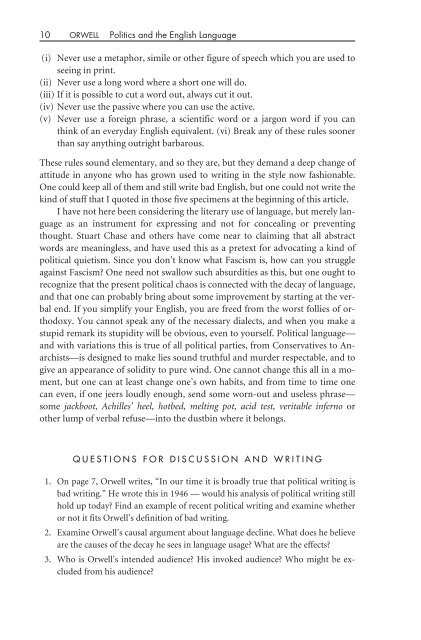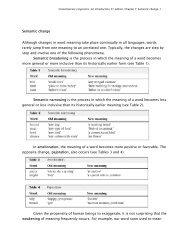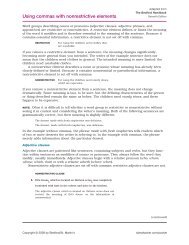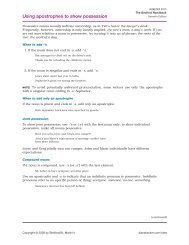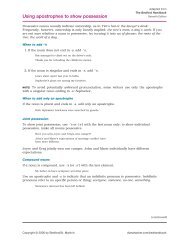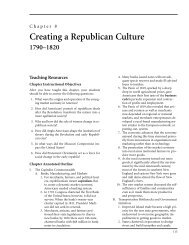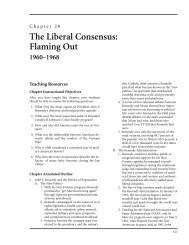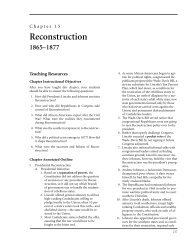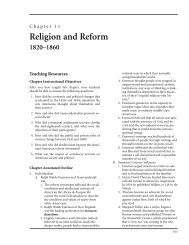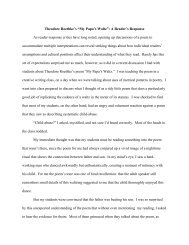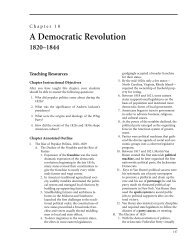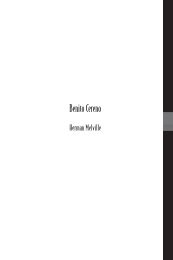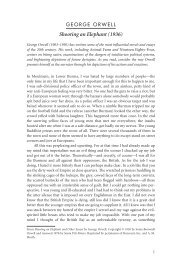GEORGE ORWELL, Politics and the English Language
GEORGE ORWELL, Politics and the English Language
GEORGE ORWELL, Politics and the English Language
You also want an ePaper? Increase the reach of your titles
YUMPU automatically turns print PDFs into web optimized ePapers that Google loves.
10 <strong>ORWELL</strong> <strong>Politics</strong> <strong>and</strong> <strong>the</strong> <strong>English</strong> <strong>Language</strong><br />
(i) Never use a metaphor, simile or o<strong>the</strong>r figure of speech which you are used to<br />
seeing in print.<br />
(ii) Never use a long word where a short one will do.<br />
(iii) If it is possible to cut a word out, always cut it out.<br />
(iv) Never use <strong>the</strong> passive where you can use <strong>the</strong> active.<br />
(v) Never use a foreign phrase, a scientific word or a jargon word if you can<br />
think of an everyday <strong>English</strong> equivalent. (vi) Break any of <strong>the</strong>se rules sooner<br />
than say anything outright barbarous.<br />
These rules sound elementary, <strong>and</strong> so <strong>the</strong>y are, but <strong>the</strong>y dem<strong>and</strong> a deep change of<br />
attitude in anyone who has grown used to writing in <strong>the</strong> style now fashionable.<br />
One could keep all of <strong>the</strong>m <strong>and</strong> still write bad <strong>English</strong>, but one could not write <strong>the</strong><br />
kind of stuff that I quoted in those five specimens at <strong>the</strong> beginning of this article.<br />
I have not here been considering <strong>the</strong> literary use of language, but merely language<br />
as an instrument for expressing <strong>and</strong> not for concealing or preventing<br />
thought. Stuart Chase <strong>and</strong> o<strong>the</strong>rs have come near to claiming that all abstract<br />
words are meaningless, <strong>and</strong> have used this as a pretext for advocating a kind of<br />
political quietism. Since you don’t know what Fascism is, how can you struggle<br />
against Fascism? One need not swallow such absurdities as this, but one ought to<br />
recognize that <strong>the</strong> present political chaos is connected with <strong>the</strong> decay of language,<br />
<strong>and</strong> that one can probably bring about some improvement by starting at <strong>the</strong> verbal<br />
end. If you simplify your <strong>English</strong>, you are freed from <strong>the</strong> worst follies of orthodoxy.<br />
You cannot speak any of <strong>the</strong> necessary dialects, <strong>and</strong> when you make a<br />
stupid remark its stupidity will be obvious, even to yourself. Political language—<br />
<strong>and</strong> with variations this is true of all political parties, from Conservatives to Anarchists—is<br />
designed to make lies sound truthful <strong>and</strong> murder respectable, <strong>and</strong> to<br />
give an appearance of solidity to pure wind. One cannot change this all in a moment,<br />
but one can at least change one’s own habits, <strong>and</strong> from time to time one<br />
can even, if one jeers loudly enough, send some worn-out <strong>and</strong> useless phrase—<br />
some jackboot, Achilles’ heel, hotbed, melting pot, acid test, veritable inferno or<br />
o<strong>the</strong>r lump of verbal refuse—into <strong>the</strong> dustbin where it belongs.<br />
QUESTIONS FOR DISCUSSION AND WRITING<br />
1. On page 7, Orwell writes, “In our time it is broadly true that political writing is<br />
bad writing.” He wrote this in 1946 — would his analysis of political writing still<br />
hold up today? Find an example of recent political writing <strong>and</strong> examine whe<strong>the</strong>r<br />
or not it fits Orwell’s definition of bad writing.<br />
2. Examine Orwell’s causal argument about language decline. What does he believe<br />
are <strong>the</strong> causes of <strong>the</strong> decay he sees in language usage? What are <strong>the</strong> effects?<br />
3. Who is Orwell’s intended audience? His invoked audience? Who might be excluded<br />
from his audience?


